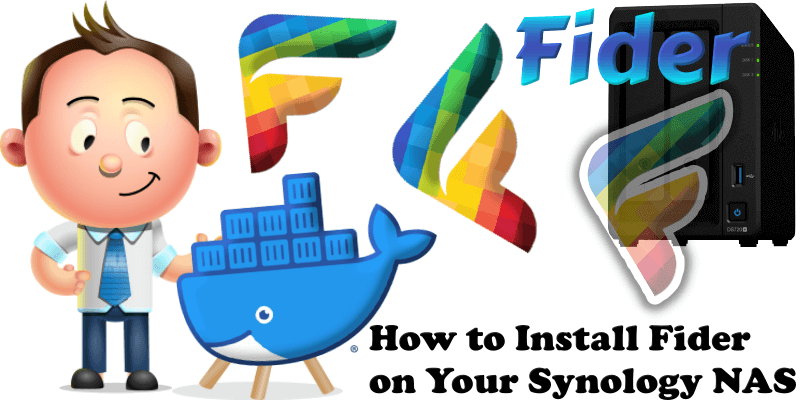
Fider is a feedback portal for feature requests and suggestions. Give your customers/visitors a voice and let them tell you what they need. Spend less time guessing and more time building the right product. In this step by step guide I will show you how to install Fider on your Synology NAS using Docker and Portainer.
This guide works perfectly with the latest Fider v0.32.0 release.
STEP 1
Please Support My work by Making a Donation.
STEP 2
Install Portainer using my step by step guide. If you already have Portainer installed on your Synology NAS, skip this STEP. Attention: Make sure you have installed the latest Portainer version.
STEP 3
Make sure you have a synology.me Wildcard Certificate. Follow my guide to get a Wildcard Certificate. If you already have a synology.me Wildcard certificate, skip this STEP.
STEP 4
Go to Control Panel / Login Portal / Advanced Tab / click Reverse Proxy. Follow the instructions in the image below.
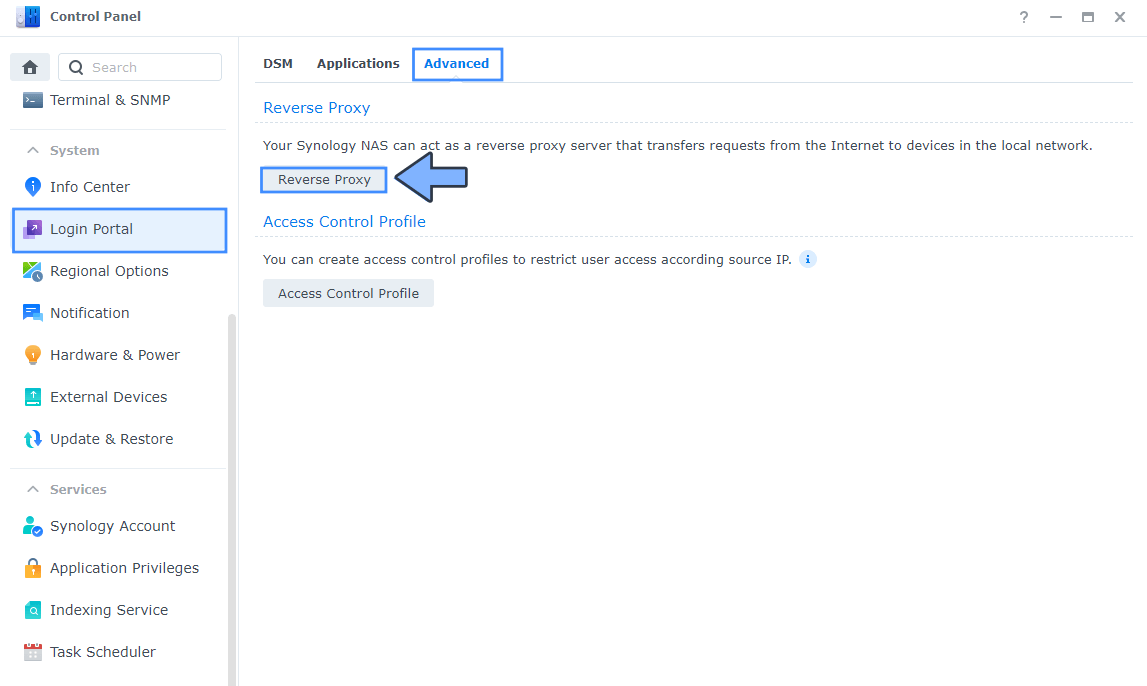
STEP 5
Now click the “Create” button. Follow the instructions in the image below.
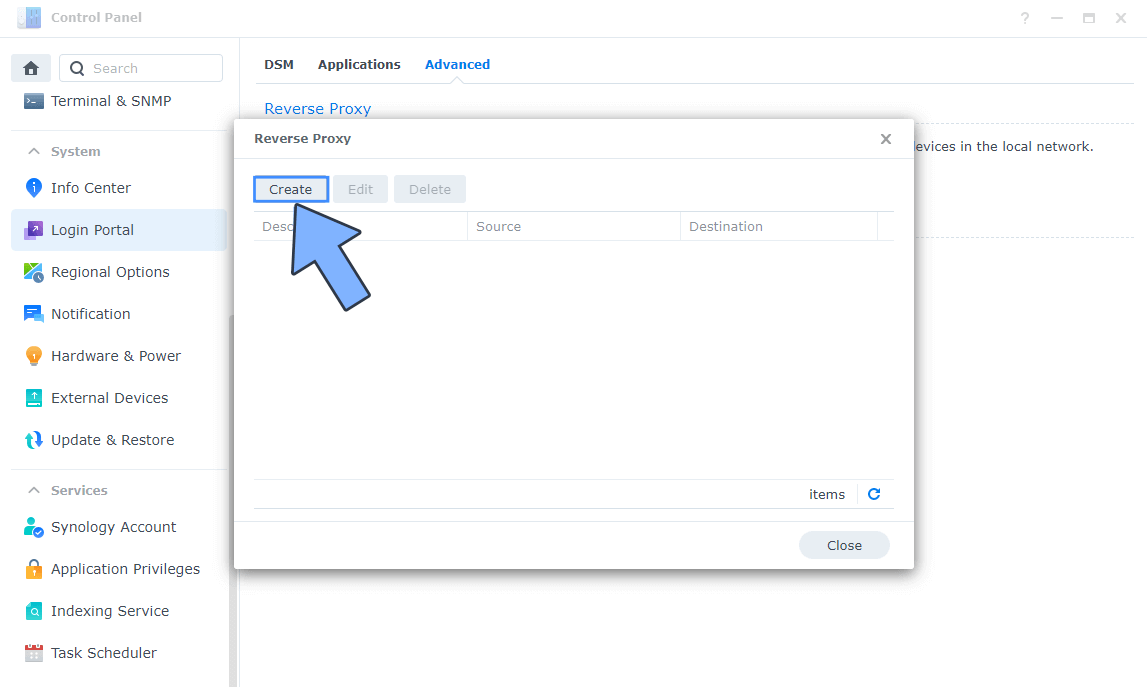
STEP 6
After you click the Create button, the window below will open. Follow the instructions in the image below.
On the General area, set the Reverse Proxy Name description: type in Fider. After that, add the following instructions:
Source:
Protocol: HTTPS
Hostname: fider.yourname.synology.me
Port: 443
Check Enable HSTS
Destination:
Protocol: HTTP
Hostname: localhost
Port: 8417
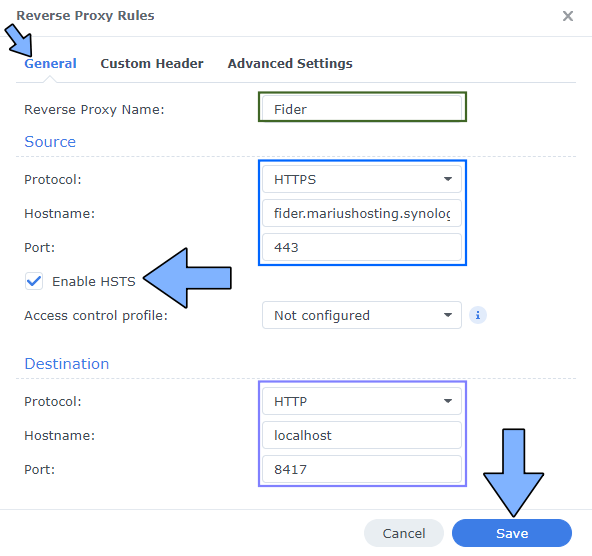
STEP 7
On the Reverse Proxy Rules, click the Custom Header tab. Click Create and then, from the drop-down menu, click WebSocket. After you click on WebSocket, two Header Names and two Values will be automatically added. Click Save. Follow the instructions in the image below.

STEP 8
Go to Control Panel / Network / Connectivity tab/ Check Enable HTTP/2 then click Apply. Follow the instructions in the image below.
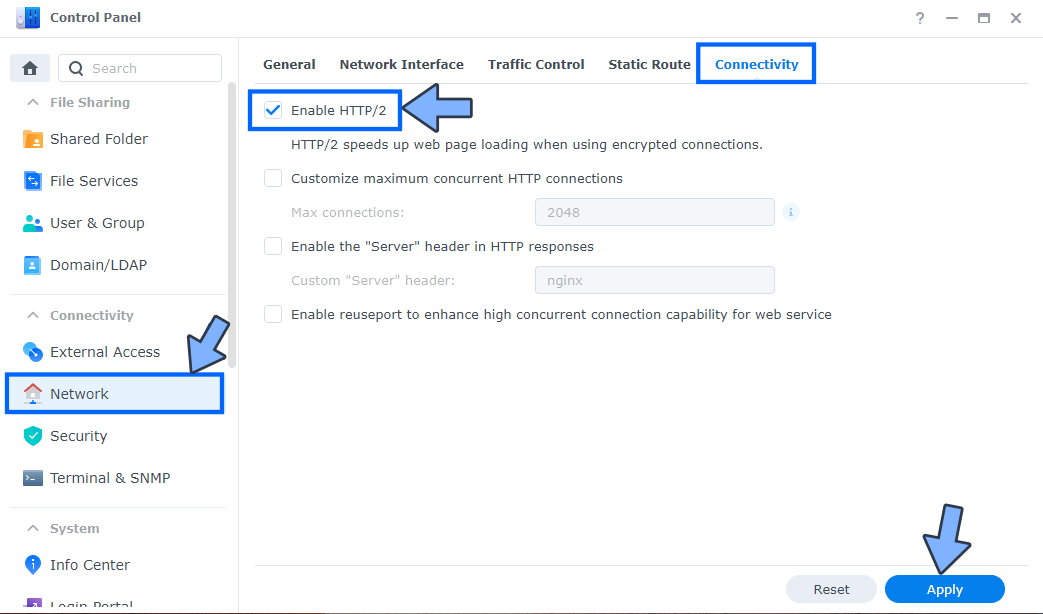
STEP 9
Go to Control Panel / Security / Advanced tab/ Check Enable HTTP Compression then click Apply. Follow the instructions in the image below.
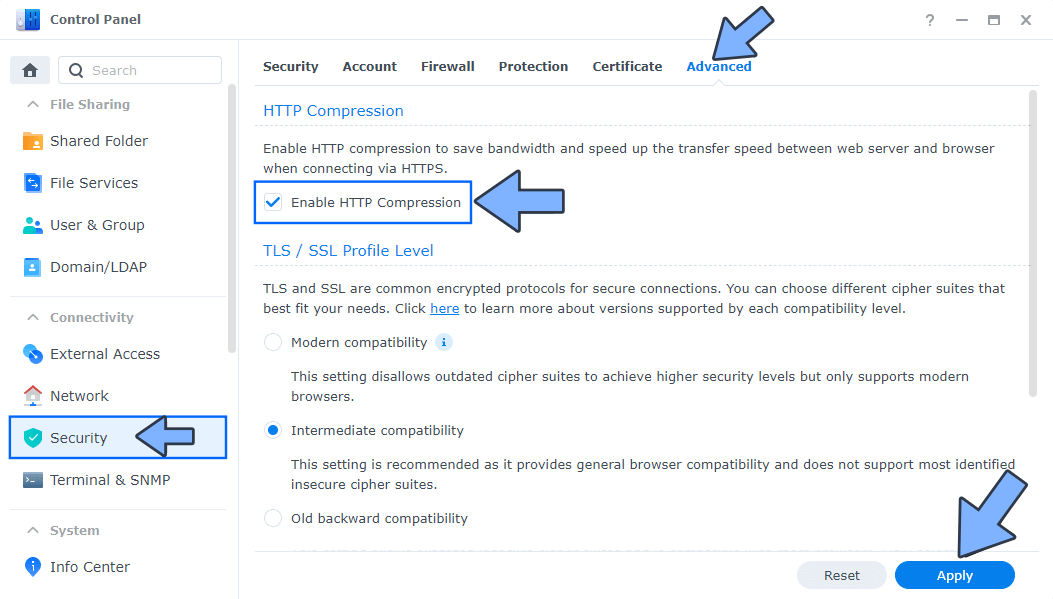
STEP 10
Go to File Station and open the docker folder. Inside the docker folder, create one new folder and name it fider. Follow the instructions in the image below.
Note: Be careful to enter only lowercase, not uppercase letters.
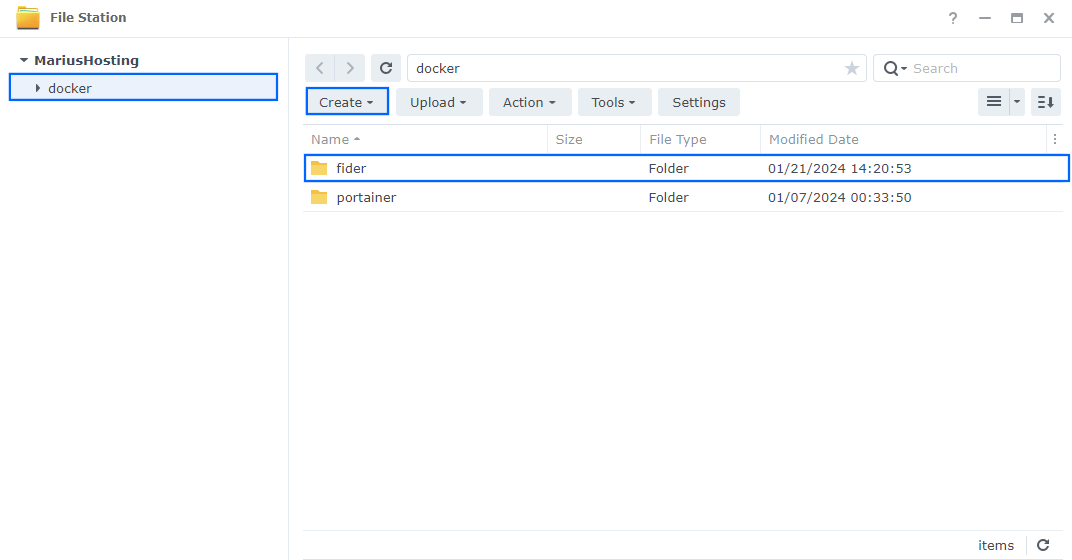
STEP 11
Follow my step by step guide on how to activate SMTP for your Gmail account. This step is mandatory. Note: If you don’t want to use the easiest way for SMTP with Google and you already have SMTP details from your own Mail Server, you can just skip this STEP and use your personalized email SMTP details instead.
STEP 12
Log into Portainer using your username and password. On the left sidebar in Portainer, click on Home then Live connect. Follow the instructions in the image below.

On the left sidebar in Portainer, click on Stacks then + Add stack. Follow the instructions in the image below.

STEP 13
In the Name field type in fider. Follow the instructions in the image below.
services:
fider-db:
image: postgres:18
container_name: Fider-DB
hostname: fider-db
security_opt:
- no-new-privileges:true
healthcheck:
test: ["CMD", "pg_isready", "-q", "-d", "fider", "-U", "fideruser"]
timeout: 45s
interval: 10s
retries: 10
volumes:
- /volume1/docker/fider:/var/lib/postgresql:rw
environment:
POSTGRES_DB: fider
POSTGRES_USER: fideruser
POSTGRES_PASSWORD: fiderpass
restart: on-failure:5
app:
image: getfider/fider:stable
container_name: Fider
ports:
- 8417:3000
environment:
BASE_URL: https://fider.yourname.synology.me
DATABASE_URL: postgresql://fideruser:fiderpass@fider-db:5432/fider?sslmode=disable
JWT_SECRET: dOxZYTTZgXKMHkqLBIQVImayQXAVWdzGBPuFJKggzcgvgPJPXpWzqzKaUOIOGGIr
EMAIL_NOREPLY: Your-own-gmail-address
EMAIL_SMTP_HOST: smtp.gmail.com
EMAIL_SMTP_PORT: 587
EMAIL_SMTP_USERNAME: Your-own-gmail-address
EMAIL_SMTP_PASSWORD: Your-own-app-password
EMAIL_SMTP_ENABLE_STARTTLS: true
restart: on-failure:5
Note: Before you paste the code above in the Web editor area below, change the value for BASE_URL and type in your own synology.me DDNS with https:// at the beginning that you have previously created at STEP 6.
Note: Before you paste the code above in the Web editor area below, change the value for JWT_SECRET. (Generate your own Random 64 length JWT_SECRET.)
Note: Before you paste the code above in the Web editor area below, change the value for EMAIL_NOREPLY and type in your own Gmail address. STEP 11.
Note: Before you paste the code above in the Web editor area below, change the value for EMAIL_SMTP_USERNAME and type in your own Gmail address. STEP 11.
Note: Before you paste the code above in the Web editor area below, change the value for EMAIL_SMTP_PASSWORD and type in your own Gmail app password. STEP 11.
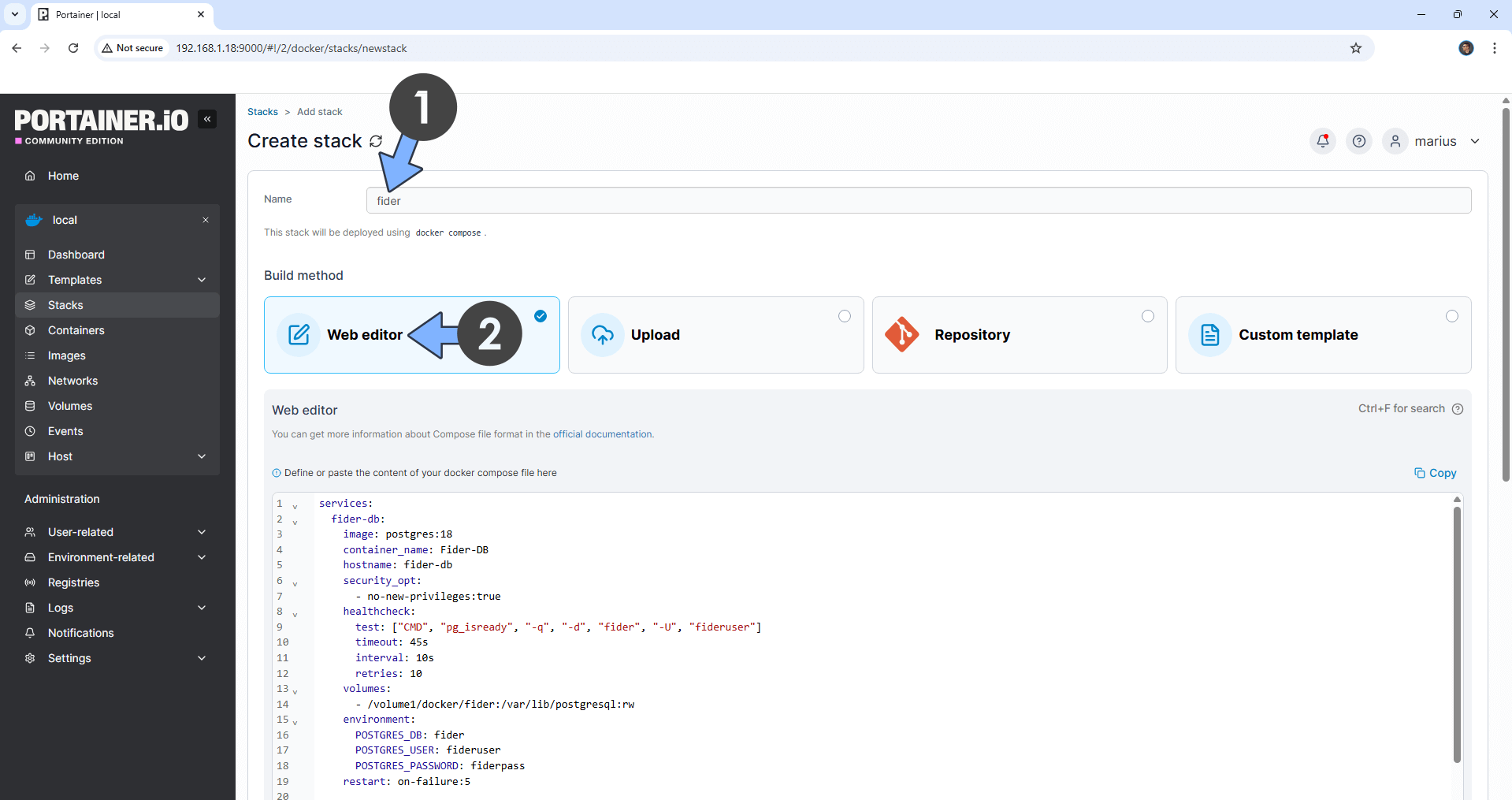
STEP 14
Scroll down on the page until you see a button called Deploy the stack. Click on it. Follow the instructions in the image below. The installation process can take up to a few minutes. It will depend on your Internet speed connection.
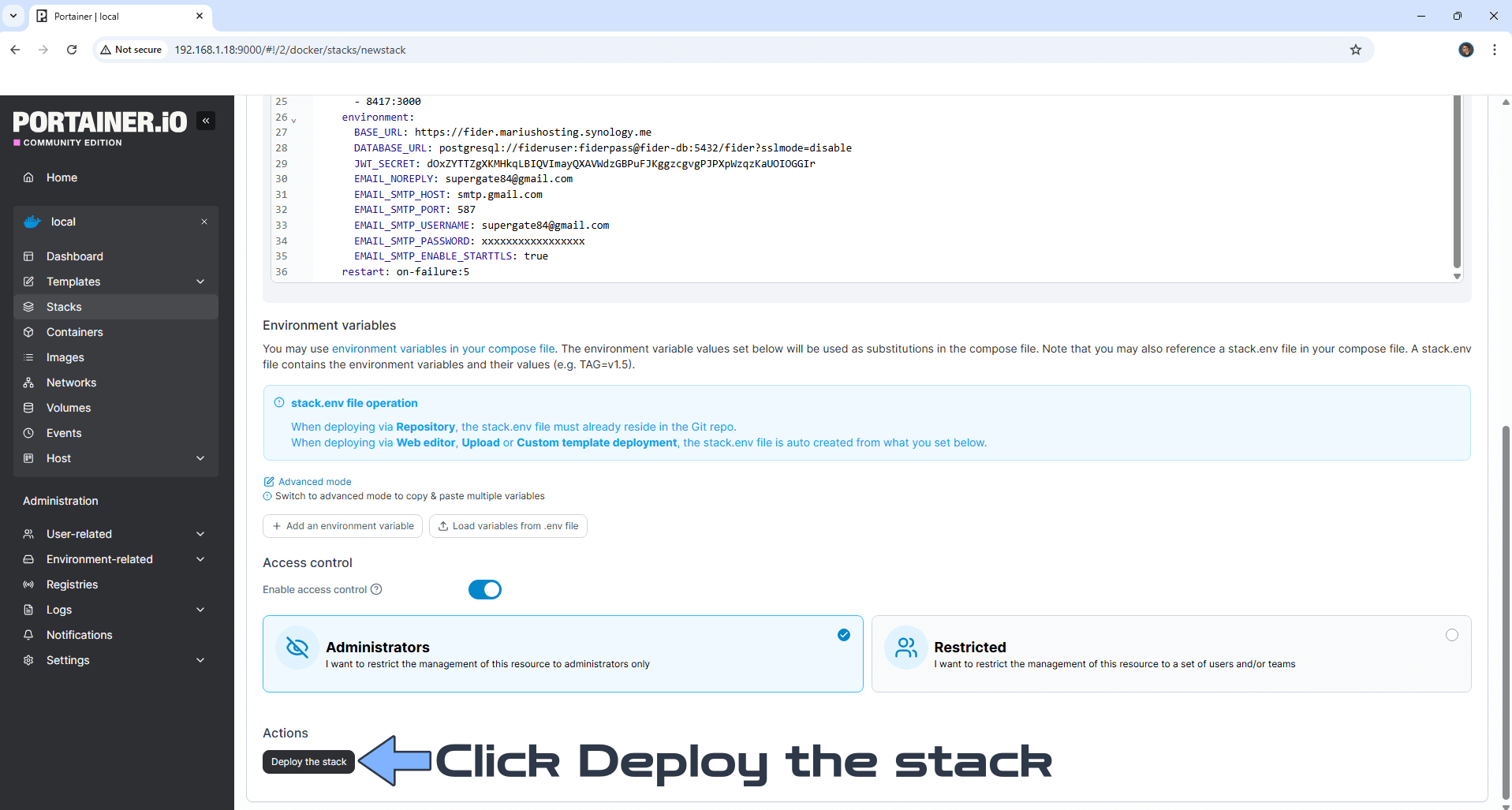
STEP 15
If everything goes right, you will see this message at the top right of your screen: “Success Stack successfully deployed“.

STEP 16
🟢Please Support My work by Making a Donation. Almost 99,9% of the people that install something using my guides forget to support my work, or just ignore STEP 1. I’ve been very honest about this aspect of my work since the beginning: I don’t run any ADS, I don’t require subscriptions, paid or otherwise, I don’t collect IPs, emails, and I don’t have any referral links from Amazon or other merchants. I also don’t have any POP-UPs or COOKIES. I have repeatedly been told over the years how much I have contributed to the community. It’s something I love doing and have been honest about my passion since the beginning. But I also Need The Community to Support me Back to be able to continue doing this work.
STEP 17
Now open your browser and type in your HTTPS/SSL certificate like this https://fider.yourname.synology.me that you have previously created at STEP 6. In my case it’s https://fider.mariushosting.synology.me If everything goes right, you will see the Fider installation page. Type in your name and email address, then give a name to the forum. Click Confirm. Follow the instructions in the image below.
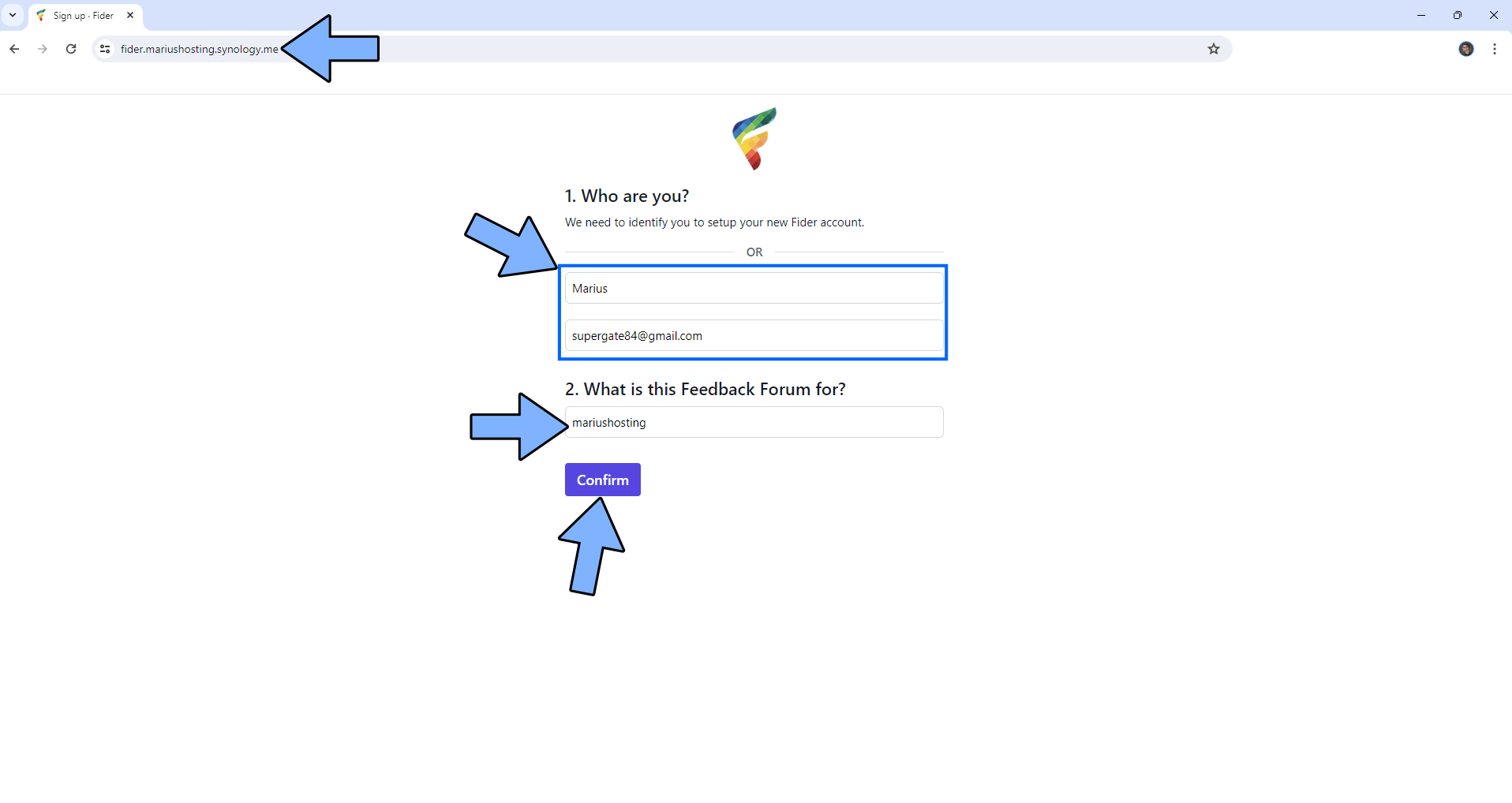
STEP 18
Check your Gmail email and click the fider link to verify your email address. Follow the instructions in the image below.
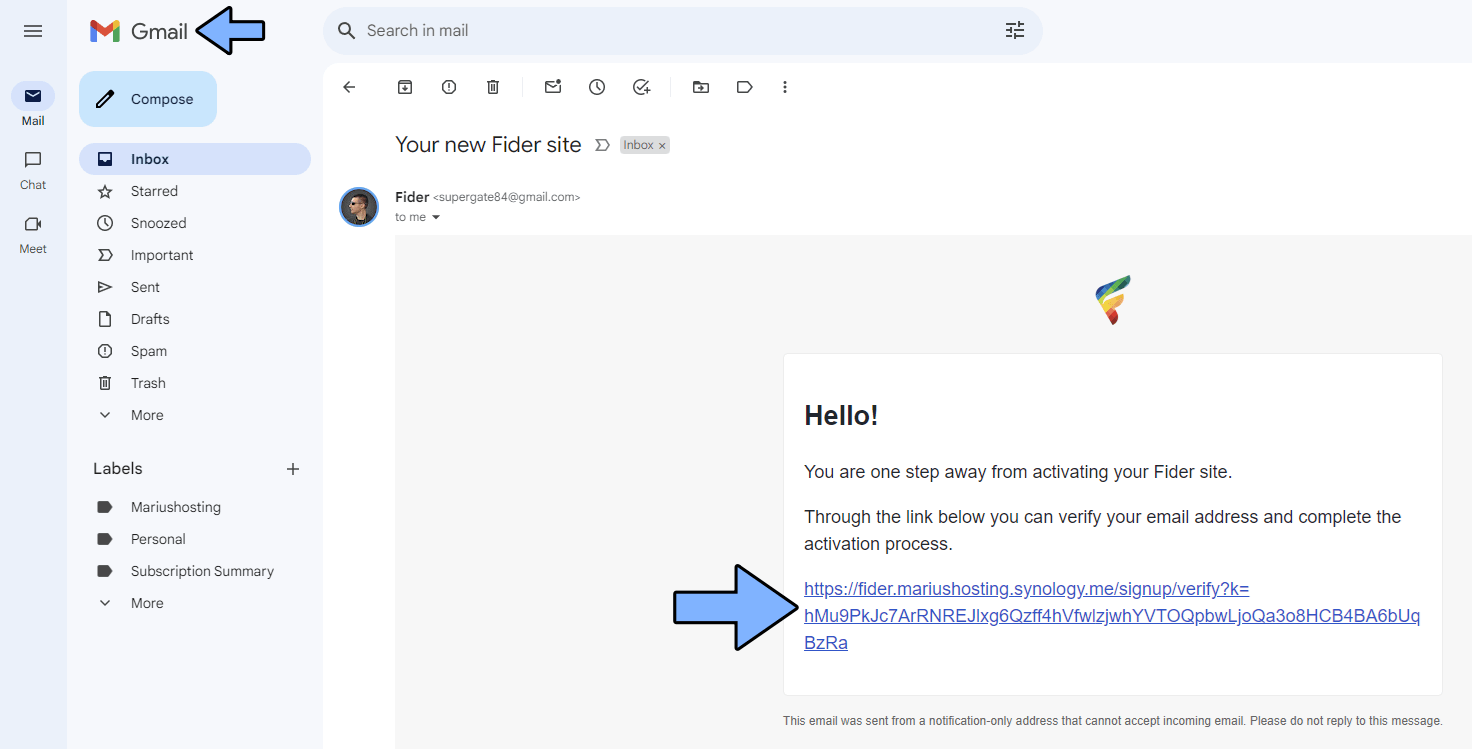
STEP 19
At the top right of the page, click on your user profile icon, then Site Settings to access your Administration page. Follow the instructions in the image below.
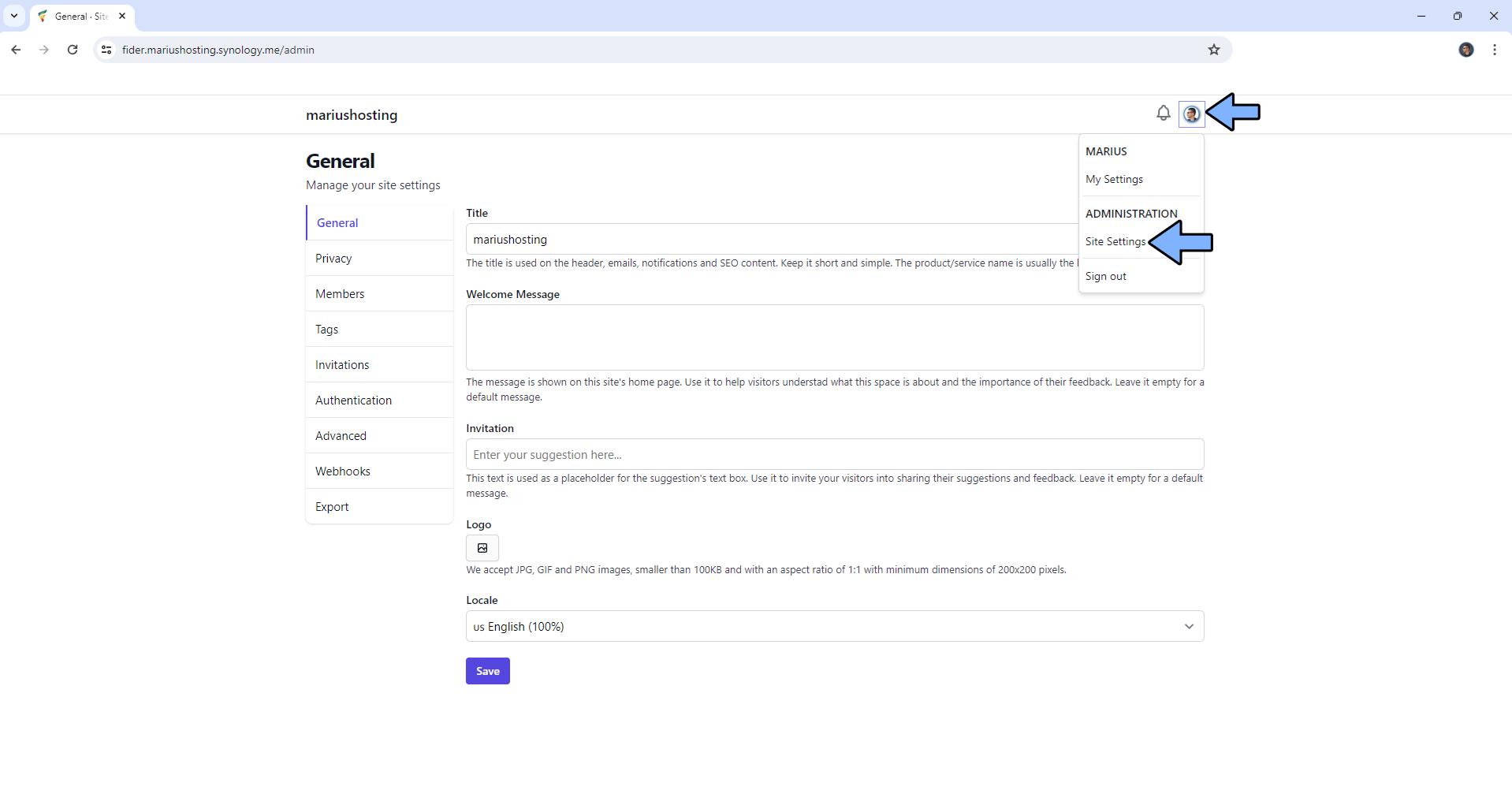
STEP 20
Add your first suggestion or let users Submit it. Follow the instructions in the image below.
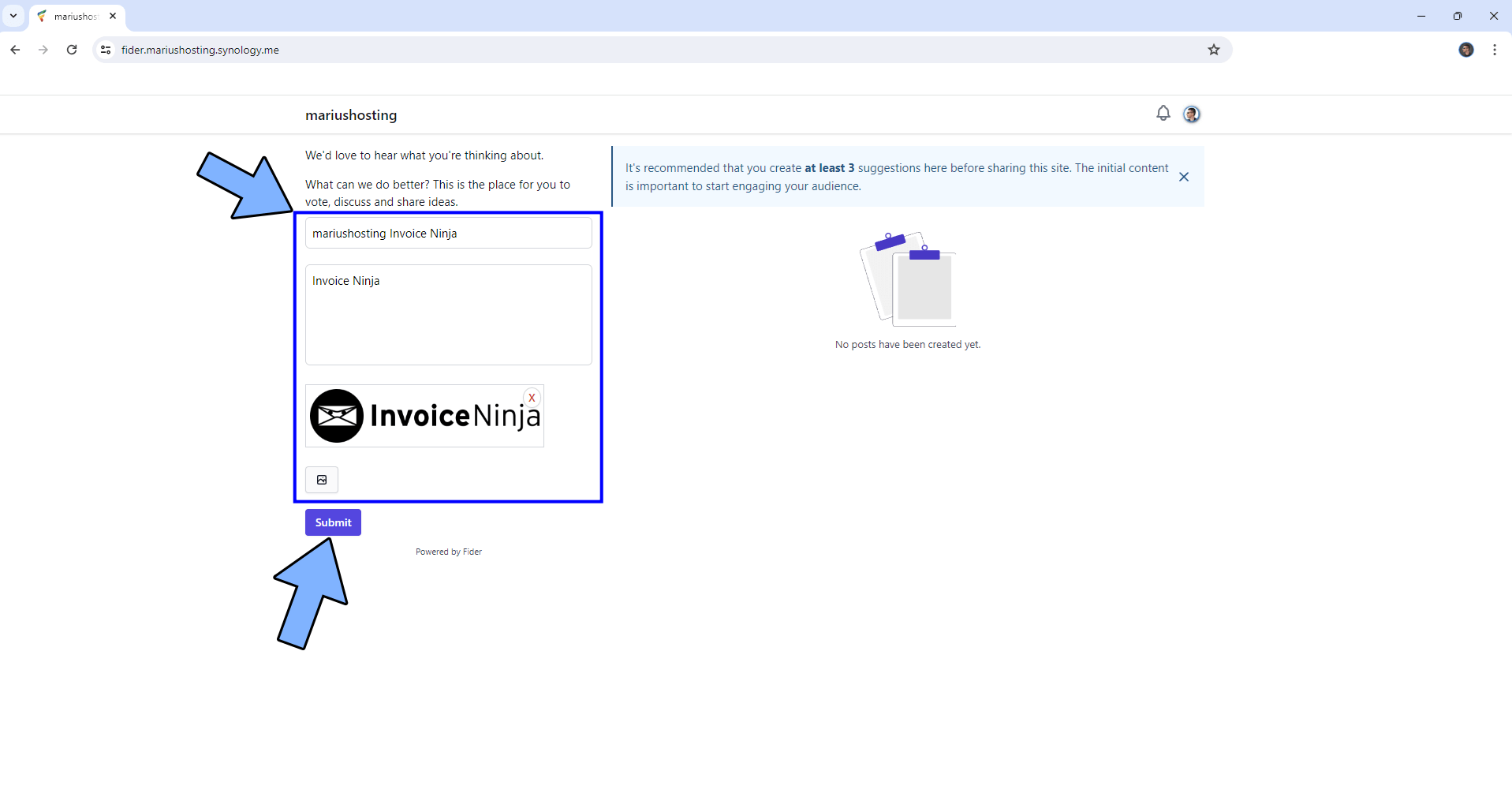
STEP 21
Your Fider dashboard at a glance!
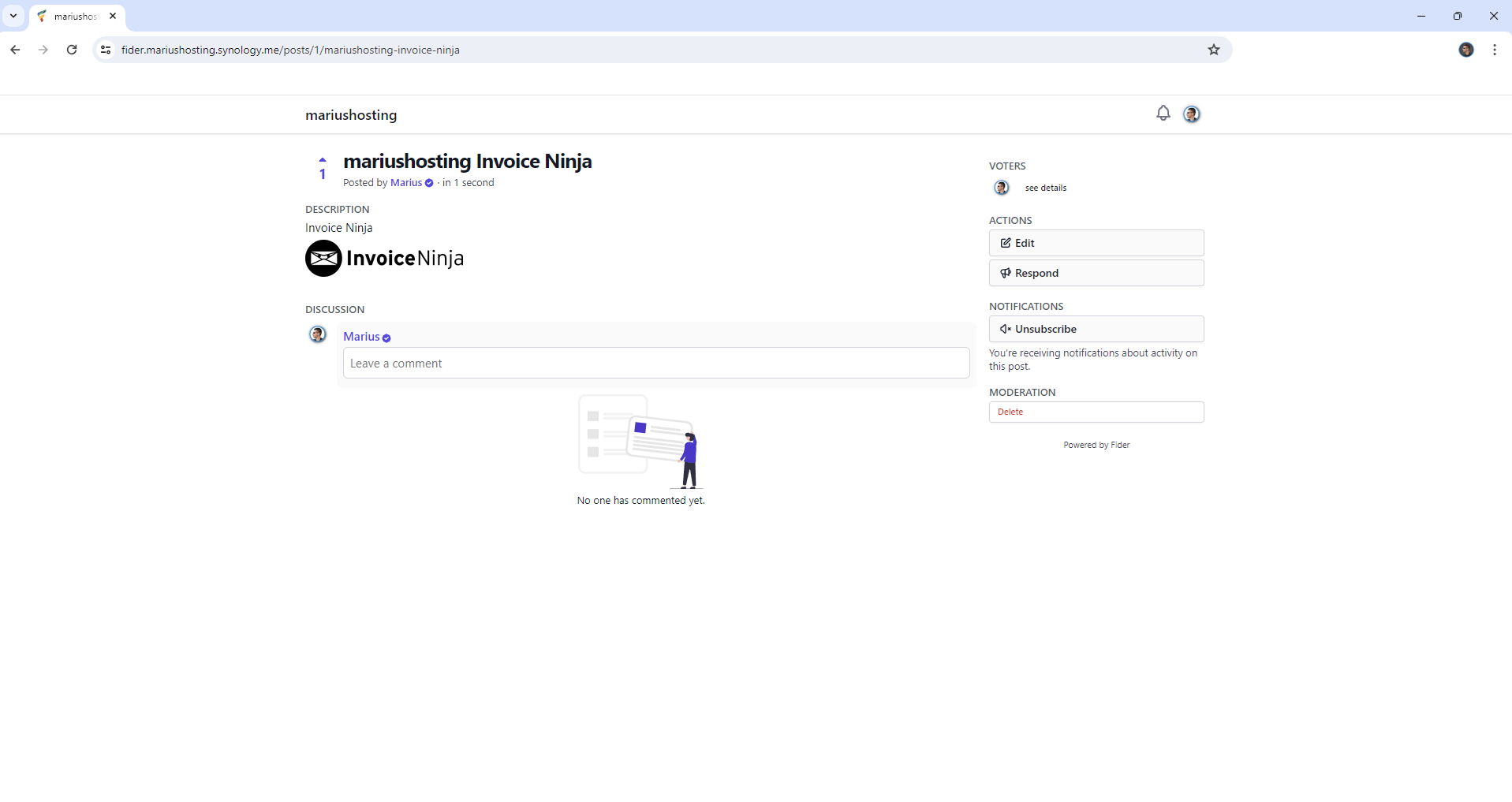
Enjoy Fider!
If you encounter issues by using this container, make sure to check out the Common Docker issues article.
Note: Find out how to update the Fider container with the latest image.
Note: How to Back Up Docker Containers on your Synology NAS.
Note: Can I run Docker on my Synology NAS? See the supported models.
Note: How to Free Disk Space on Your NAS if You Run Docker.
Note: How to Schedule Start & Stop For Docker Containers.
Note: How to Activate Email Notifications.
Note: How to Add Access Control Profile on Your NAS.
Note: How to Change Docker Containers Restart Policy.
Note: How to Use Docker Containers With VPN.
Note: Convert Docker Run Into Docker Compose.
Note: How to Clean Docker.
Note: How to Clean Docker Automatically.
Note: Best Practices When Using Docker and DDNS.
Note: Some Docker Containers Need WebSocket.
Note: Find out the Best NAS Models For Docker.
Note: Activate Gmail SMTP For Docker Containers.
This post was updated on Monday / February 2nd, 2026 at 12:39 PM
